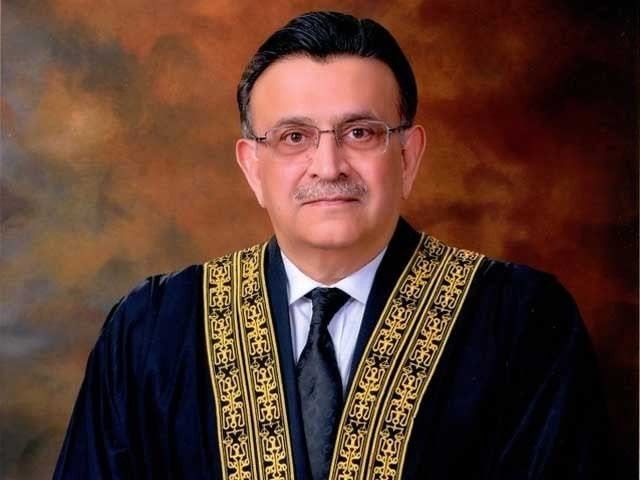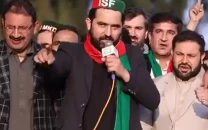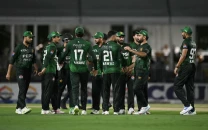CJP takes suo motu notice over polls delay
Nine-member larger bench to assess eligibility on issuing elections' date

As the election process remains virtually paralysed by tensions between the stakeholders who disagree on the electoral law, Chief Justice of Pakistan Umar Ata Bandial on Wednesday stepped in and took suo motu notice of the delay in holding polls in Punjab and Khyber-Pakhtunkhwa.
The chief justice constituted a nine-member larger bench to adjudicate on the matter and said there was an apparent lack of clarity on the matter. The bench, which will hear the case on Thursday (today) at 2pm, comprises the CJP, Justice Ijazul Ahsan, Justice Syed Mansoor Ali Shah, Justice Munib Akhtar, Justice Yahya Afridi, Justice Sayyed Mazahar Ali Akbar Naqvi, Justice Jamal Khan Mandokhail, Justice Muhammad Ali Mazhar and Justice Athar Minallah.
Last week, a division bench of the Supreme Court referred the matter to CJP Bandial for invoking suo motu jurisdiction, warning that there was an eminent danger of violation of the Constitution.
Hearing a petition filed by Ghulam Mehmood Dogar, who had been repatriated to the federal government, the court stressed that it was refraining from passing on order on the election matter, because it was not before the bench.
The development comes as the vote has been made complicated by a deepening rift between rival political parties – mainly the PTI and the PDM – and an ‘imbroglio of indecision’ roiling the prolonged consultations between the Election Commission of Pakistan and the relevant authorities.
A statement issued by the apex court said the bench will assess who was eligible to issue the date for polls, the constitutional responsibility of the federation and provinces, and who will fulfil the constitutional responsibility of conducting elections and when.
“It is the government’s responsibility to conduct elections in Punjab and K-P according to the Constitution,” it said. In the notice, CJP Bandial said that the top court’s bench would consider the following questions:
- Who has the constitutional responsibility and authority for appointing the date for the holding of a general election to a provincial assembly, upon its dissolution in the various situations envisaged by and under the Constitution?
- How and when is this constitutional responsibility to be discharged?
- What are the constitutional responsibilities and duties of the federation and the province with regard to the holding of the general election?
The Supreme Court added that the two provincial assemblies were dissolved on January 14 and 18, respectively. “Under Article 224 (2), polls should be held within 90 days of the assembly dissolution. The Constitution mandates that polls be held within 90 days.”
It also said that requests for the date of elections were also received from the Islamabad High Court bar and the K-P and Punjab assemblies’ speakers.
The CJP's order stated that several provisions of the constitution needed to be considered as well as the relevant sections of the Elections Act.
"In particular, the issues involve, prima facie, a consideration of Article 17 of the Constitution and enforcement, inter alia, of the fundamental right of political parties and the citizens who form the electorates in the Punjab and KPK provinces to exercise their right to elect representatives of their choice to constitute fresh assemblies and provincial cabinets,” he emphasised.
This, he underlined, was necessary for government in the two provinces to be carried on in accordance with the Constitution, adding that these matters involve the performance of constitutional obligations of great public importance apart from calling for faithful constitutional enforcement.
The CJP, in his written order, further bemoaned that more than one month had elapsed since the dissolution of the provincial assemblies and it seemed prima facie that the matter of appointing the date of the general elections, which was the first step towards the holding of the elections, was still not resolved.
"Constitutional authorities appear to hold divergent, and perhaps even conflicting, views on the issue. Thus, several federal ministers appear to have contested the authority asserted by the president. Since ministers act under the constitutional rule of collective responsibility it appears, prima facie, that this is the view taken by the federal cabinet as a whole,” the statement read.
The order further noted that the Election Commission of Pakistan (ECP) was not being provided with the required assistance to hold the polls.
"It is also to be noted that statements attributed to the Election Commission have appeared in the public record to the effect that it is not being provided the requisite assistance and support, in particular by the provision of necessary funds, personnel and security, as would enable it to hold the general elections in accordance with the Constitution."
The order also mentioned the recent communication between President Arif Alvi and the ECP.
"There is another material development in the last few days. It appears that subsequent to certain correspondence initiated by the President of Pakistan with the Election Commission, the President has taken the position that it is he who has the authority and responsibility for appointing a date for the general elections, in terms as provided in section 57(1) of the Elections Act, 2017. By an order made on 20.02.2023, the President has appointed 09.04.2023 to be the date for the holding of the general elections in both provinces and has called upon the Election Commission to fulfil its constitutional and statutory obligations in this regard."
‘Exclusion of senior judges’
Former president of Sindh High Court Bar Association (SHCBA) Salahuddin Ahmed lauded the decision of the CJP for rightly taking the suo motu notice of the delay in holding polls.
However, he expressed misgivings over the exclusion of senior judges, including Justice Qazi Faez Isa, Justice Sardar Tariq Masood and Justice Aminuddin Khan, calling into question the decision to keep them away from the case.
He also believed that Justice Naqvi should be recused and the next senior should replace him.
Meanwhile, a government official revealed to The Express Tribune that 57 days would be required to complete the election process from the announcement date.
The official said that there was no chance that polls in Punjab and K-P would be held until April 9. Likewise, the month of Ramazan is going to start next month, he added.
The government faces a severe shortage of funds to hold elections and the electoral watchdog requires Rs42 billion for the timely holding of polls. It is said that the government is not in a position to arrange funds for elections before the next budget.
Sources said that national institutions, especially the army and judiciary, are unwilling” to extend help to the ECP keeping in view the PTI’s past conduct wherein the party leaders had accused several government functionaries of rigging the 2013 elections.
Meanwhile, the ex-SHCBA president wondered why the PTI lawyers were applauding the Lahore High Court single judge order directing the ECP to set the date and hold elections in 90 days until the last three days when the president announced the date himself and the apex court bench hearing IG Dogar’s case abruptly veered into issue pertaining to election supervisor’s power to set the date.



















COMMENTS
Comments are moderated and generally will be posted if they are on-topic and not abusive.
For more information, please see our Comments FAQ